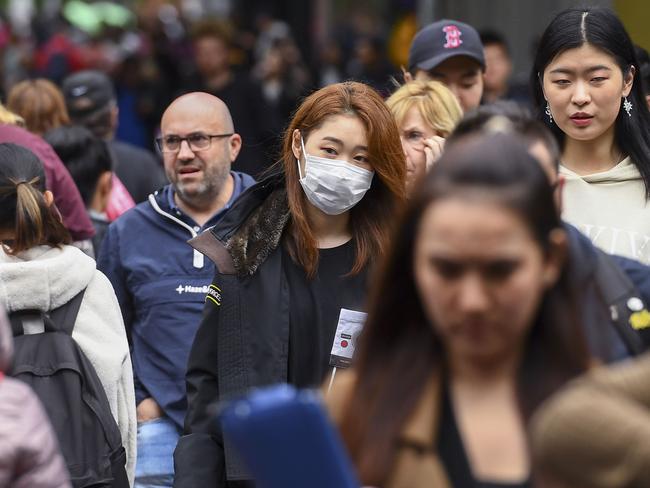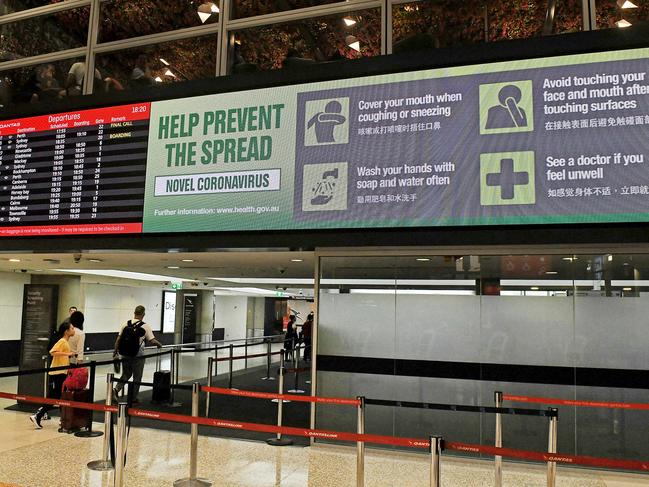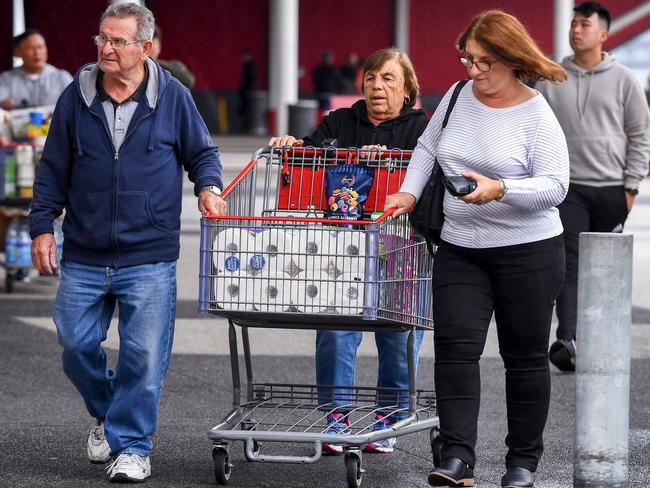Coronavirus: Fifty-five medicines in short supply as coronavirus exposes world’s reliance on India and China for drugs
The race to slash medical costs has seen the western world become dependent on India and China for supply and Covid-19 is placing pressure on supply. See the list of medicines at a critical level.
Illness
Don't miss out on the headlines from Illness. Followed categories will be added to My News.
More than 460 medicines, vaccines and other pharmaceutical products are already unavailable or in short supply in Australia even before fallout from the Covid-19 impacts global medicine supplies.
With chemists and the Federal Government warning the public not to panic buy medicines, the coronavirus has exposed the world’s and Australia’s dangerous reliance on India and China for life saving cheap medicines.
Panic buying has seen paracetamol and cold and flu remedies stripped from shelves as people also try to get bulk supplies of prescription medicine.
Paracetamol is the main medicine used to treat the fever and pain symptoms of coronavirus.
GSK which manufactures Panadol said: “At this time, we have adequate stock in place, however this is an evolving situation which we will keep under review”.

It refused to directly answer when asked if it sourced ingredients for Panadol from China.
A News Corp investigation has found some major pharmaceutical giants have only two to three months supply of finished products available.
“The Therapeutic Goods Administration (TGA) is using information it has about Chinese manufacturers and is having active discussions with Australian medicine sponsors, wholesalers and pharmacists to determine any potential future impact to medicine supply,” a spokesman for the department said.
Major pharmaceutical companies said there were currently no Covid-19 associated medicine shortages and the Pharmacy Guild said it was not aware of medicines which were currently “unavailable or in short supply in Australia specifically because of Covid-19,” Pharmacy Guild president Mr Tambassis said.
The medicines regulator, the TGA, said it had not been notified of any current medicine shortages in Australia that are a direct result of (Covid-19).
“Stockpiling of medicines may unintentionally create a shortage at the local level,” a spokesman for the Department of Health said.
A high level US inquiry has been told up to 80 per cent of the raw ingredients needed to manufacture generic medicines and many finished pharmaceuticals are produced in China.
But many of these factories have been shut down for weeks as that country battles to contain the spread of the virus.
India produces many of Australia’s generic medicines using these ingredients and its government this week restricted the export of 26 medicines and pharmaceutical ingredients including those used to make paracetamol and key antibiotics.
The US Food and Drug Administration has warned that one undisclosed drug was already in short supply in the United States because of problems related to the virus outbreak and its watching about 20 other drugs whose manufacturers relied solely on China.

Medicines Australia which represents major pharmaceutical companies conceded medicine supply was under pressure.
“The impact of significant national crises’ does place pressure on such things as the medicines supply chain, particularly as Australia relies heavily on importation of medicines and domestic manufacturing is limited,” the lobby group said.
“Medicines manufacturers are committed to ensuring supply of the medicines that Australians need when they need them”.
Local medicine manufacturers contacted by News Corp have said they are ready to produce extra stocks of antibiotics and could try to fill gaps in life saving medicine supplies if imports are disrupted.
MORE NEWS:
You’ll soon have to show ID to watch porn
AAP closure triggers media stoush
Global pledge for press freedoms rejected
Australian stocks gain on stimulus hopes
As the virus continues to spread the Federal Government is in active discussions with Australian medicine sponsors, wholesalers and pharmacists to determine any potential future impact to medicine supply.
AbbVie which produces Kaletra, a HIV antiviral being trialled in Brisbane as a treatment for Covid-19, said none of its medicines were so far affected by coronavirus.
“We are committed to ensuring supply of Kaletra for HIV patients around the world and don’t anticipate any supply disruptions,” the company said.
One the world’s biggest pharmaceutical companies Pfizer told News Corp globally it holds on average of between six and 12 months of the active pharmaceutical ingredients needed to produce medicines.
It has two to three months supply of finished pharmaceuticals.
Pfizer operates three manufacturing plants in Australia in Perth, Mulgrave and Adelaide and said less than two per cent of its active pharmaceutical ingredients and key materials globally are sourced from China.
MSD said “the outbreak currently has had a limited effect on the company’s supply chain of drugs and raw materials out of China”.
The TGA said in Australia, medicines sponsors are legally required to report anticipated shortages of prescription medicines and some over-the-counter medicines.

The Pharmacy Guild said rules prevented chemists supplying multiple repeats of the same medicine unless the prescribing doctor authorised it.
Pharmaceutical company Roche, which supplies 42 medicines including some for multiple sclerosis, haemophilia, kidney disease, arthritis and influenza, said none of the drugs they supply in Australia are manufactured in China.
“Globally, we are assessing our supply chains and our suppliers’ supply chains for components and raw materials sourced from impacted countries, including China, as we determine the coverage and potential impact due to the Covid-19 outbreak,” a spokesperson said.
“As of now, we have not identified any critical component that would impact our ability to supply in the near future, based on current demand forecast.
“Local inventory is sufficient to meet current demand for a number of months, with Tamiflu more than 12 months.”
The Generic Biosimilar Medicines Association which represents companies that produce generic medicines that represent 70 per cent of the PBS scripts in Australia said it was “urgently working with its members and the Australian Government to minimise the disruption of any potential medicine shortages arising from the spread of the Covid-19 virus.”
It was unable to say what percentage of the raw ingredients for their products were sourced from China.
“Generic manufacturers, on average, hold three to four months’ worth of stock. This will vary across the product range. Our members are working with their suppliers to confirm availability and bring forward orders where needed,” the association said.
